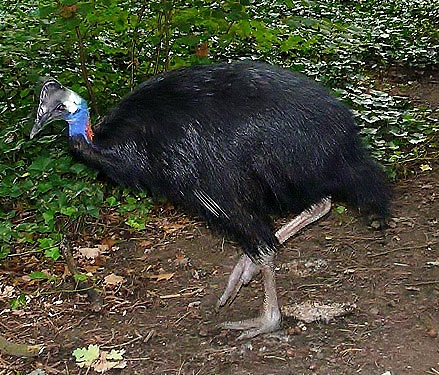 |
| (Photo from Zoo Institutes) |
Common name:
dwarf cassowary (en); casuar-pequeno (pt); casoar de Bennett (fr); casuario menor (es); Bennettkasuar (de)
Taxonomy:
Order Struthioniformes
Family Casuariidae
Range:
These birds are endemic to the island of New Guinea, both in Indonesia and Papua-New Ginea. They are also present in the surrounding small islands of New Britain, Ceram and Japen.
Size:
The dwarf cassowary is 100-135 cm long and weighs 17-18 kg.
Habitat:
They are found in moist tropical forest, from sea level up to an altitude of 3.600 m.
Diet:
They mainly feed on fleshy fruits, collected on the forest floor. They often eat the fruits whole, and the seeds pass undamaged through the gut, making them an important disperser of seeds. They also take other foods, such as fungi, other plant parts, and even lizards and frogs.
Breeding:
Dwarf cassowaries breed in May-November. They are polyandrous, with each female mating with several males during each breeding season. The nest is a pile of leaves, at the base of a tree, where the female lays 3-6 large greenish eggs. The female has no further part in the breeding process, moving on to mate with other males. The male incubates the eggs for 49-52 eggs. The chicks leave the nest within hours of hatching and are able to walk and feed themselves, but the male protects them until they become independent, 7-16 months after hatching. Dwarf cassowaries reach sexual maturity after 4 years.
Conservation:
IUCN status – NT (Near-Threatened)
This species has a large breeding range and, although the global population size has not been quantified, the dwarf cassowary is described as generally scarce, but locally common in north-eastern New Guinea. The population is believed to be declining, due to habitat loss and degradation and hunting. Logging and the construction of new roads and airstrips make new areas available for hunters, so the hunting pressure may be becoming worse. Predation by pigs and dogs may be an additional threat to this species.







